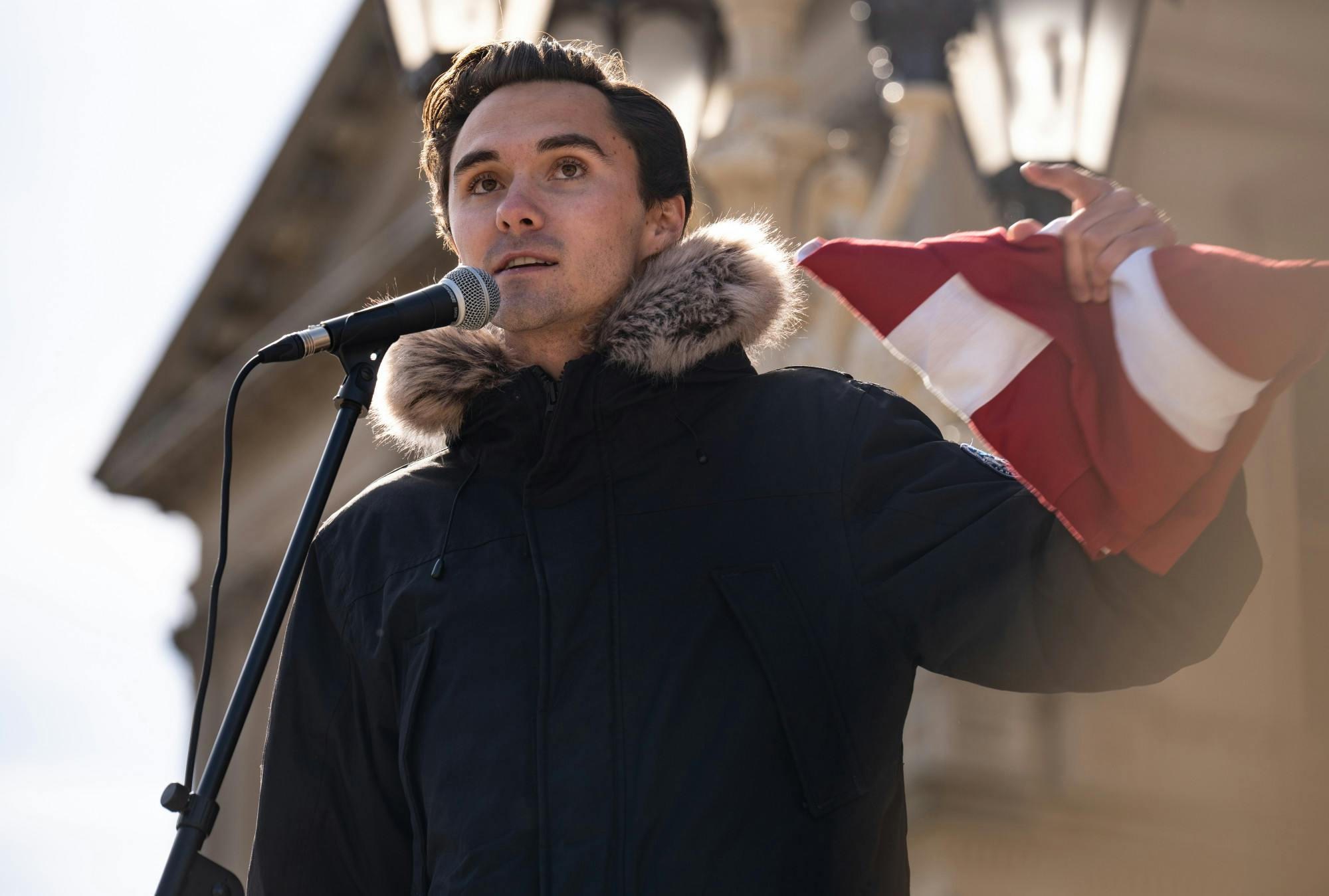In the shadow of Michigan’s Capitol building, steps from the building which houses the state Department of Education, on the morning of Feb. 20, student survivors of gun violence gathered alongside legislators and Lansing community leaders to tell their stories.
Survivors of three mass shootings were present- MSU students reeling from the events of just a week prior, Oxford High School activists who survived the 2021 Oxford shooting, and March for Our Lives founder David Hogg, who survived the 2018 mass shooting at Marjory Stoneman Douglas High School in Parkland, Florida.
Oxford alumna and Olivia Upham, who was recently accepted to teach abroad in Africa with the U.S. Peace Corps, said she’s unsure of how she’ll represent American education to her new students.
“What would I tell them,” Upham said. “What is there to represent? Do I tell my new students that before our children are scholars or athletes or silly or mischievous or carefree or creative, they are targets? Do I tell them here, in one of the wealthiest, safest countries in the world, we are accepting and tolerant of our own being slaughtered while studying?”
Sen. Rosemary Bayer, D-Beverly Hills, spoke about gun reform initiatives that legislative Democrats intend to pursue in the coming weeks. Bayer serves as the chair of the Firearm Safety and Violence Prevention Caucus in the state House and Senate.
She said to expect movement on universal background checks, secure storage of firearms and “red flag” laws that would keep people with mental health issues or histories of domestic abuse from being able to purchase a firearm.
“We introduced and expect to pass those bills,” Bayer said during the conference. “All of these have been effective in other states. All of these bills will be part of making Michigan safer for all of us.”
Bayer and Rep. Brenda Carter, D-Pontiac, both said hearing from survivors has inspired them to bring gun control legislation to the forefront of Democratic priorities, during the first legislative session in decades that the party will be able to advance its agenda on the issue.
"We don't want to wait till later on," Carter said. "We don't want to wait to the next incident. We need to have sensible gun reform now. If we had had those background checks, if we had had safe storage, ... we still may have had these young people here with us today."
MSU’s chapter of March for Our Lives, or Spartans Against Gun Violence, was present at the press conference. Their members were joined by national board members Hogg and Mariah Cooley to spread the organization’s message of reforming gun laws across the country. Hogg said the issue of preventing gun violence should be a bipartisan rallying point.
“The cycle that we're in of endless debate and inaction is not working,” Hogg said. “And I know that this is not something that just Democrats are tired of, or just Republicans are tired of.”
Hogg, one of a group of Parkland students who rose to prominence as activists after fourteen students and staff members were killed at the Florida high school on Feb. 14, 2018, said he’s tired of the responsibility of ending mass shootings falling on youth and students.
“I often hear older people saying ‘Thank God the kids are here,’” Hogg said. “Stop it. You're not dead yet. We need you. We need every generation in this fight with us.”
The press conference was hosted in conjunction with Pamela L. Pugh, president of the Michigan State Board of Education. Pugh said the board intends to work alongside Democratic legislators to move forward with gun reform measures at the state level.
“So we use our bully pulpit,” Pugh said. “We call on friends. We advocate, we talk as loud as we can. And that is what we do.”
MSU students present at the event spoke about the collective trauma of being on campus during the university’s shelter-in-place order, from barricading dorm room doors to sending frantic text messages to their parents.
Hogg offered advice on dealing with the residual feelings that result from traumatic experiences.
“There's no way to come back from something that never should have happened,” Hogg said. “There's only learning to live in a new normal as you go forward, and I think for some people what that looks like is speaking out … making sure that this doesn't continue as much as possible. But for others, it looks like stepping back and reestablishing what community looks like in the wake of these things.”
Lansing NAACP chapter treasurer Nicole Evans said MSU students may feel the effects of the last week for awhile, even if they weren't present on campus or in immediate danger during the shooting.
“What you don't understand is trauma is trauma, whether it's real or perceived in that moment,” Evans said.
Support student media!
Please consider donating to The State News and help fund the future of journalism.
Other speakers included representatives from the two teacher unions, Michigan Education Association and the Michigan Federation of Teachers. MSU Romance and Classical studies Professor Victor Rodriguez-Pereira spoke too.
Rodriguez-Pereira, who is vice president of the Union of Non-Tenure Track Faculty at MSU, said he's unsure how to transition back to regular school life and how the events of the last week will impact his future as a professor.
"Balancing every first day of the semester, the happiness and excitement of a new class, with the fear and concern of where is the nearest exit and how many of my students am I going to be able to protect," Rodriguez-Pereira said.
Discussion
Share and discuss “March for Our Lives activist David Hogg visits Lansing, calls for gun control reform” on social media.







